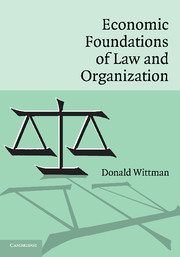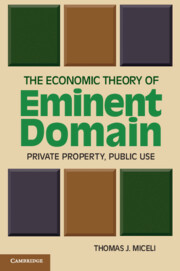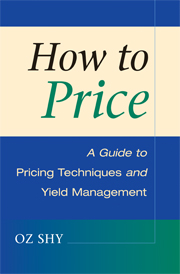Economic Foundations of Law and Organization
$55.99 (X)
- Author: Donald Wittman, University of California, Santa Cruz
- Date Published: June 2006
- availability: Available
- format: Paperback
- isbn: 9780521685245
$
55.99
(X)
Paperback
-
This book serves as a compact introduction to the economic analysis of law and organization. At the same time it covers a broad spectrum of issues. It is aimed at undergraduate economics students who are interested in law and organization, law students who want to know the economic basis for the law, and students in business and public policy schools who want to understand the economic approach to law and organization. The book covers such diverse topics as bankruptcy rules, corporate law, sports rules, the organization of Congress, federalism, intellectual property, crime, accident law, and insurance. Unlike other texts on the economic analysis of law, this text is not organized by legal categories but by economic theory. The purpose of the book is to develop economic intuition and theory to a sufficient degree so that one can apply the ideas to a variety of areas in law and organization.
Read more- Most student-friendly, accessible, model-driven text on law, economics, and business in the market
- Has 74 boxed examples, review questions, clear organization, suggested readings
- Author has been refining text in classroom for over 20 years
Reviews & endorsements
"A huge amount of law, as it relates both to individual rights and social organization, can be simply and effectively explained by the consistent application of a few basic economic concepts. In this volume, Don Wittman deftly uses two key tools - an accurate definition of social welfare and the critical role of transaction costs - to show the common threads that unite such disparate legal fields as bankruptcy, contracts, land use planning, and torts. His useful, rigorous and readable introduction to the principles of economics lays the groundwork for further study at the intersection of law and social organizations." - Richard A. Epstein, University of Chicago
See more reviews"Wittman has written an economists' law and economics text. It is organized around economic, not legal, principles. It provides an economic analysis of legal and organizational issues. More importantly, it showcases the power and flexibility of economic analysis in unusual and interesting settings." - Paul H. Rubin, Emory University
"Readers will welcome the sophistication of this book on the new and growing subject of economics and law for its two distinctive qualities. First, it is organized around themes of economic theory. This allows the reader to gain a kind of insight that would not be possible were the book organized in the more usual way, according to legal subject matter. Second, the book covers more than purely legal subject matter - it discusses important aspects of organizations and their governance. I enthusiastically recommend the book to students and scholars alike." - Steven Shavell, Harvard Law School
"Wittman takes a fresh approach to law and economics, rethinking the traditional subject areas and covering many new ones." - Michelle J. White, University of California, San Diego
"Wittman has succeeded in writing a textbook that distinguishes itself from the competition in its topical orientation and its organizational structure.... I would recommend this book to instructors who teach law-and-economics to general economics majors (or as a prelude to a more advanced law-and-economics course), or, as Wittman suggests in his introduction, a supplement to intermediate microeconomics courses focusing on the Coase Theorem and transaction costs." - Eastern Economic Journal
Customer reviews
Not yet reviewed
Be the first to review
Review was not posted due to profanity
×Product details
- Date Published: June 2006
- format: Paperback
- isbn: 9780521685245
- length: 402 pages
- dimensions: 254 x 178 x 21 mm
- weight: 0.72kg
- contains: 2 tables 74 exercises
- availability: Available
Table of Contents
1. Introduction
Part I. Economic Fundamentals - Rationality and Efficiency:
2. Rational behavior, preferences and prices
3. Pareto optimally versus utilitarianism
4. Cost-benefit analysis
Part II. Transaction Costs and the Coasean Revolution:
5. Transaction costs
6. Fencing in and fencing out
7. Coase versus Pigou
Part III. Cost-Benefit Analysis and the Law:
8. How to think like an economist: two hawks and a fence
9. Smoking regulations: market solutions
10. Rules of thumb: sports and driving rules
Part IV. Rights:
11. The protection of entitlements
12. Property rights or communal rights in knowledge?
13. Liability for harm or restitution for benefit
14. Takings: should there be compensation for regulation
Part V. Torts and Crimes: Liability Rules and Punishments:
15. Cost minimization and the role of liability rules
16. Negligence rules
17. Crime and criminal law
Part VI. The Role of Sequence:
18. Mitigation of damages and last clear chance
19. The Good Samaritan rule
20. The role of being first in allocating entitlements
Part VII. Contracts and Breach of Contract:
21. Default rules and breach of contract
22. When is a handshake a contract and when is a contract not a contract
23. Marriage as contract: family law
Part VIII. Harms Arising Between Contracting Parties:
24. Exploding coke bottles
25. The role of asymmetric information
26. Consumers and producers cause damage: lawnmowers
Part IX. Insurance and the Law:
27. The market for insurance
28. Royalties for artists and insurance for investors
29. Regulating automobile insurance
30. Bankruptcy
31. Deposit insurance and banking crises
Part X. Governance and Organization:
32. The governance of organization
33. Corporate law and agency problems
34. Insider trading
35. Organizational response to opportunism
36. The organization of legislatures
37. Federalism
38. The internal organization of the family
Part XI. Bargaining in the Shadow of a Trial:
39. Settlement of cases
Table of cases.Instructors have used or reviewed this title for the following courses
- Economics of the Common Law
- Gov Regulation of Business
- Mass Media Management
Sorry, this resource is locked
Please register or sign in to request access. If you are having problems accessing these resources please email [email protected]
Register Sign in» Proceed
You are now leaving the Cambridge University Press website. Your eBook purchase and download will be completed by our partner www.ebooks.com. Please see the permission section of the www.ebooks.com catalogue page for details of the print & copy limits on our eBooks.
Continue ×Are you sure you want to delete your account?
This cannot be undone.
Thank you for your feedback which will help us improve our service.
If you requested a response, we will make sure to get back to you shortly.
×







